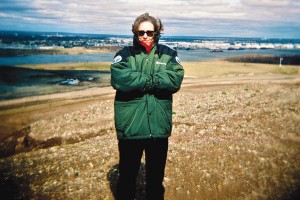“Some people play fantasy baseball,” says Robin Nagle. “I play fantasy sanitation.” Nagle, an anthropologist at New York University, imagines idealized sanitation departments: the most reliable crews, the most capable garage supervisors.
For more than a decade, Nagle has studied New York City’s department of sanitation. For a while, she even joined it. For two years, she drove garbage trucks and street sweepers, emptied sidewalk trash cans, and salted winter streets. Nagle’s forthcoming book, Picking Up, is a personal and anthropological exploration of the department and its often-overlooked service. “I still have my CDL” (commercial driver’s license), she says proudly.
New York City garbage anthropologist Robin Nagle

On a bitter gray January morning, Nagle is sitting in a dark and cozy diner in Manhattan’s meatpacking district. The tables are full of tradesmen and cops warming up over coffee, but no “san men” come in. It’s the middle of a shift. They’re outside working.
Central among Nagle’s themes is the paradox—she would call it the injustice—of sanitation work. It is absolutely vital to any modern society. It is also largely invisible.
In the 1890s, when New York’s sanitation department really came into its own, the san man helped rid the city of its endemic vermin and disease. “His broom saved more lives in the crowded tenements than a squad of doctors,” wrote the reformer Jacob Riis. Street sweepers got their own parade down Fifth Avenue. Today, the department’s disappearance from public view seems to be reflected by Manhattan 2, a yellow-brick sanitation garage a block from the diner, separated from the city by the West Side Highway and a row of rosebushes. It sits on a narrow peninsula jutting into the Hudson River. Like much of the rest of Manhattan’s West Side, the peninsula is built of landfill—that is, garbage.
The department runs 24 hours a day, 365 days a year, clearing the waste of the city’s eight million residents and plowing its 6,300 miles of streets and highways after storms. Constantly exposed to disease, traffic, and heavy machinery, sanitation workers have the seventh-highest rate of on-the-job deaths—higher than law enforcement or firefighting.
Nagle discovered the job’s invisibility during a parade, as she warned sandal-clad spectators to move out of the way of her broom’s coarse bristles. Nobody heard her. “It’s not that they were ignoring me,” she writes. “I was never part of their awareness.” That attitude goes along with the perception that the work is demeaning. Even san men themselves aren’t immune to the idea. Nagle recalls trying to convince a coworker that his work was important: “‘Aw, bullshit,’ he’d say, dismissing me with a wave of his hand. Even after decades on the job, he still hasn’t told the neighbors what he does for a living. His wife is happier that way.”
Still, thousands of hopefuls apply for just a few hundred open positions at the department each year. Nagle saw one man struggling to pass a driving exam; in desperation he tried to slip the examiner $100, and as a result had his license revoked. She describes what it cost him: “Our salaries, though meager … would be relatively secure. We’d have benefits, a pension, and a union with real muscle. … I would never know why the young man thought a bribe was a good idea, but I understood why his wife was crying.”
Sanitation has its own language. San men call Bronx 7, where the mass of garbage is legendary, “House of Pain.” Treasure rescued from trash is “mongo.” Nagle jokes that to be true to lingo, Picking Up should have been called Getting It Up, the in-house term for garbage collection. But that “might have gotten it shelved in the wrong department.”
Winter is called “night plow.” The whole department goes on 24-hour alert, with at least one crew in each of the 59 sanitation garages ready to clear the streets at any time. In the winter of 2010–11, when a Boxing Day blizzard was followed by months of additional snow, some workers were on the job for 41 days straight.
But this morning, there is no snow on the streets. Neither is there any garbage. The invisible workers have done their invisible work.




